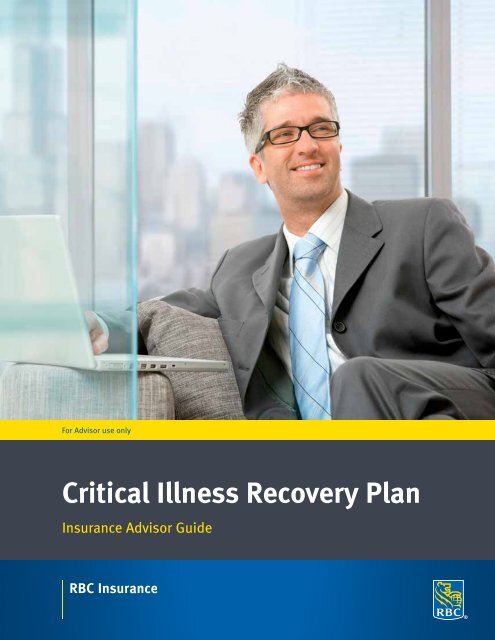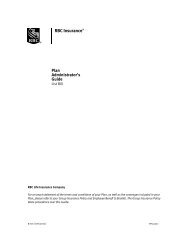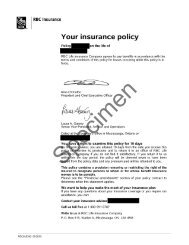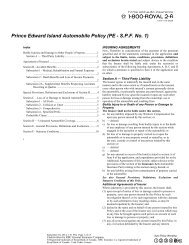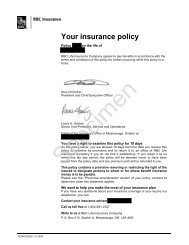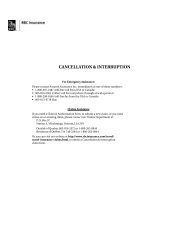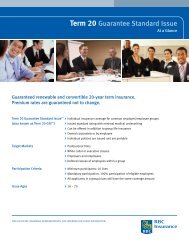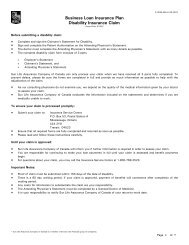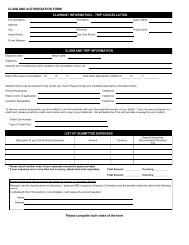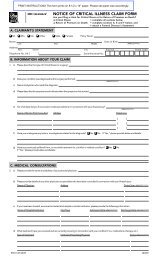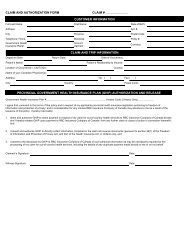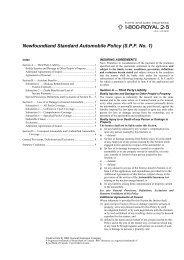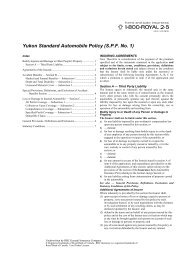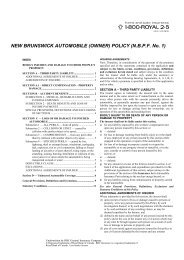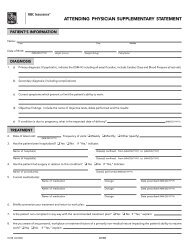Critical Illness Recovery Plan - RBC Insurance
Critical Illness Recovery Plan - RBC Insurance
Critical Illness Recovery Plan - RBC Insurance
You also want an ePaper? Increase the reach of your titles
YUMPU automatically turns print PDFs into web optimized ePapers that Google loves.
For Advisor use only<br />
<strong>Critical</strong> <strong>Illness</strong> <strong>Recovery</strong> <strong>Plan</strong><br />
<strong>Insurance</strong> Advisor Guide
1 <strong>Critical</strong> <strong>Illness</strong> <strong>Recovery</strong> <strong>Plan</strong> — <strong>Insurance</strong> Advisor Guide<br />
Table of contents<br />
<strong>Plan</strong> code 2<br />
Product Type 2<br />
Purpose and market 2<br />
<strong>Plan</strong> type 3<br />
Non-cancellable 3<br />
Guaranteed renewable 3<br />
Underwriting guidelines 3<br />
Occupational classes 3<br />
Minimum lump sum benefit 3<br />
Maximum lump sum benefit 3<br />
Participation limit 3<br />
Base plan issue ages chart 3<br />
Riders issue ages chart 4<br />
Payment modes 4<br />
Applications for critical illness coverage 4<br />
<strong>Critical</strong> illness medical requirements 4<br />
Notes regarding critical illness insurance medical requirements 4<br />
Family history 5<br />
Financial underwriting 5<br />
Individual coverage 5<br />
Business coverage 6<br />
Policy benefits 6<br />
Lump sum critical illness benefit 6<br />
Covered conditions 6<br />
Early assistance benefit 11<br />
<strong>Critical</strong> illness while outside Canada 11<br />
Long term care conversion option 11<br />
Conversion privilege (built into Term T10NC) 12<br />
Partial conversions 12<br />
Credit for return of premium 12<br />
Exclusions12<br />
Moratorium period exclusion for benign brain tumour13<br />
Moratorium period exclusion for cancer 13<br />
Moratorium period exclusion for Parkinson’s disease and Parkinsonian disorders 13<br />
Providing more than a claim cheque 13<br />
Best Doctors 13<br />
About Best Doctors 14<br />
Services offered 14<br />
Daily Living Assistance 14<br />
Healing the Whole Person 14<br />
Optional benefits 15<br />
Disability waiver of premium rider 15<br />
Return of premium on death rider 15<br />
Scheduled increase benefit rider 15
<strong>Critical</strong> <strong>Illness</strong> <strong>Recovery</strong> <strong>Plan</strong> — <strong>Insurance</strong> Advisor Guide 2<br />
<strong>Plan</strong> code<br />
10-year term, renewable to age 75, convertible to age 65 —<br />
T10NC<br />
Level premiums to age 65 (guaranteed renewable) —<br />
T65GR<br />
Level premiums to age 75 (guaranteed renewable) —<br />
T75GR<br />
Level premiums to age 75 (non-cancellable) — T75NC<br />
Product type<br />
Individual lifestyle protection<br />
Purpose and market<br />
<strong>RBC</strong> <strong>Insurance</strong> ® <strong>Critical</strong> <strong>Illness</strong> <strong>Recovery</strong> <strong>Plan</strong> is designed<br />
as a perfect complement to income protection coverage. It<br />
can be used to cover additional expenses your client may<br />
face if they suffer from a severe injury or catastrophic illness,<br />
such as cancer, a heart attack or a stroke. Income protection<br />
coverage, on the other hand, is designed to protect everyday<br />
living expenses.<br />
Note: Please refer to policy language for a complete list of covered<br />
conditions and their definitions.<br />
<strong>Critical</strong> <strong>Illness</strong> <strong>Recovery</strong> <strong>Plan</strong> policies provide a one time<br />
lump sum benefit to your clients who are diagnosed with<br />
and survive a covered critical illness. This benefit will assist<br />
your clients in making meaningful decisions about their<br />
physical and financial recovery and will help protect their<br />
standard of living. They may use the benefit in any manner<br />
they choose, such as:<br />
• To make payments for a mortgage, business loans or other<br />
debts;<br />
• To make alterations to a home or automobile to<br />
accommodate any special needs;<br />
• To protect retirement savings;<br />
• To supplement income protection coverage;<br />
• To obtain specialized medical treatment, private nursing<br />
or child care; and<br />
• To obtain out-of-country or non-government covered<br />
treatments.<br />
The <strong>Critical</strong> <strong>Illness</strong> <strong>Recovery</strong> <strong>Plan</strong> policy isn’t just about<br />
financial help. By including Assistance Services, the policy<br />
provides more than a claim cheque. These valuable services<br />
are designed to assist your clients in their recovery by<br />
addressing a range of common needs among critical illness<br />
survivors. Three separate services are built in to all of our<br />
plan types:<br />
• Best Doctors ‡<br />
• Daily Living Assistance<br />
• Healing the Whole Person
3 <strong>Critical</strong> <strong>Illness</strong> <strong>Recovery</strong> <strong>Plan</strong> — <strong>Insurance</strong> Advisor Guide<br />
The <strong>Critical</strong> <strong>Illness</strong> <strong>Recovery</strong> <strong>Plan</strong> policy is available to a wide range of individuals, including those who already have or are<br />
applying for income protection coverage. As well, it is available to many individuals who are traditionally unable to qualify for<br />
income protection coverage due to their level of income (including non-working spouses), occupation, type of employment or<br />
even certain non-critical-illness related medical histories.<br />
<strong>Plan</strong> type<br />
The <strong>Critical</strong> <strong>Illness</strong> <strong>Recovery</strong> <strong>Plan</strong> policy is available in multiple versions:<br />
Non-cancellable and guaranteed renewable until:<br />
• Age 75 (Term 10 or level premiums to age 75 policies). We cannot change the plan provisions or premiums from those<br />
stated in the policy.<br />
Guaranteed renewable until age 65 or until age 75. We cannot change the plan provisions, but the premiums may be subject<br />
to change. However, we cannot change the premium unless we do so for an entire group of policyholders sharing similar<br />
characteristics.<br />
The policy will be terminated at the earliest of:<br />
• Termination by the owner;<br />
• Death of the insured;<br />
• Lapse of the policy;<br />
• Conversion of the policy;<br />
• Payment in full of the critical illness benefit; or<br />
• The expiry date, or if the insured is satisfying a survival period, then the day after such survival period.<br />
Underwriting guidelines<br />
Occupational classes: The <strong>Critical</strong> <strong>Illness</strong> <strong>Recovery</strong> <strong>Plan</strong> policy is not class specific. There are restrictions on some hazardous<br />
occupations, such as hazardous waste handlers, explosives handlers or deepsea commercial divers.<br />
Minimum lump sum benefit: $25,000 (increments of $1,000)<br />
Maximum lump sum benefit: $2,000,000 (increments of $1,000)<br />
Participation limit: $2,000,000<br />
Base <strong>Plan</strong> Issue Ages Chart<br />
Level premiums to age 75 (non-cancellable) T75NC 18 to 65<br />
10-year term renewable to age 75, convertible to age 65 (non-cancellable) T10NC 18 to 64<br />
Level premiums to age 65 (guaranteed renewable) T65GR 18 to 60<br />
Level premiums to age 75 (guaranteed renewable) T75GR 18 to 65
<strong>Critical</strong> <strong>Illness</strong> <strong>Recovery</strong> <strong>Plan</strong> — <strong>Insurance</strong> Advisor Guide 4<br />
Riders Issue Ages Chart<br />
Disability waiver of premium rider 18 to 55<br />
Return of premium on death rider<br />
Same as base plan<br />
Scheduled increase benefit (SIB) rider 18 to 45<br />
Payment modes<br />
• Annual (pre-authorized chequing and direct billing)<br />
• Monthly (pre-authorized chequing)<br />
Applications for critical illness coverage<br />
<strong>Critical</strong> illness coverage may be applied for by completing one of the following two applications:<br />
• The standalone <strong>Critical</strong> <strong>Illness</strong> <strong>Recovery</strong> <strong>Plan</strong> Application<br />
(83550 – English; 83551 – French)<br />
• The Disability and/or <strong>Critical</strong> <strong>Illness</strong> <strong>Insurance</strong> Application as directed for critical illness<br />
(83530 – English; 83531 – French)<br />
<strong>Critical</strong> <strong>Illness</strong> Medical Requirements<br />
Age<br />
Blood profile, urine profile<br />
and paramedical<br />
Blood profile, urine profile,<br />
paramedical and ECG<br />
Blood profile, urine<br />
profile, exam and ECG<br />
Blood profile, urine profile,<br />
exam and stress ECG<br />
18 – 40 Over $249,999 N/A N/A N/A<br />
41 – 50 $100,001 – $250,000 Over $250,000 N/A N/A<br />
51 – 55 $25,001 – $100,000 $100,001 – $1,499,000 N/A Over $1,499,000<br />
56 – 60 $0 – $100,000 $100,001 – $1,499,000 N/A Over $1,499,000<br />
61 – 65 N/A $0 – $250,000 $250,001 – $1,499,000 Over $1,499,000<br />
Notes regarding critical illness insurance medical requirements<br />
If the insured is between the ages of 18 and 40 and applying for less than or equal to $249,000, there are no medical requirements.<br />
Otherwise, the following applies:<br />
• Urine/HIV, blood profile, hepatitis screen, paramedical, exam by an MD are considered current for six months.<br />
• Electrocardiograph (ECG) is considered current for one year.<br />
• Total amount of critical illness insurance coverage includes the following:<br />
– Current amount of critical illness insurance applied for;<br />
– Current amount of scheduled increase benefit rider applied for; and<br />
– Any previous amount of critical illness coverage issued, including any scheduled increase benefit rider amount and<br />
Guarantee Standard Issue ® offering (also known as GSI ® ), since medical requirements were last satisfied.<br />
• If applying for the scheduled increase benefit rider, the sum of all future increases must be added to the base critical illness<br />
indemnity to calculate the total amount of coverage for the purpose of determining the medical requirements.
5 <strong>Critical</strong> <strong>Illness</strong> <strong>Recovery</strong> <strong>Plan</strong> — <strong>Insurance</strong> Advisor Guide<br />
Each time the applicant has completed the automatic<br />
medical requirements, resulting in our issuing standard<br />
coverage, eligibility for non-medical insurance is renewed.<br />
The next time the applicant applies for coverage, the<br />
in-force coverage issued as a result of the automatic medical<br />
requirements is disregarded for the purpose of determining<br />
medical requirements. Only the current amount of coverage<br />
being applied for is used to determine requirements.<br />
Example:<br />
A 45-year-old has $200,000 of critical illness insurance<br />
coverage in force with the scheduled increase benefit rider,<br />
issued standard. At the time of application, a blood profile,<br />
urine profile, paramedical and ECG were submitted. He is<br />
now applying for an additional $100,000 of critical illness<br />
insurance coverage. Current medical requirements: none.<br />
• If applying for critical illness insurance, along with<br />
individual or business disability coverage, please consult<br />
the medical requirements for both critical illness<br />
insurance and individual disability coverage to determine<br />
the overall medical requirements. The highest level of<br />
automatic requirements will apply.<br />
• Testing for hepatitis is not a routine requirement for<br />
critical illness insurance unless applying in conjunction<br />
with a request for individual or business disability<br />
coverage where a hepatitis screen is an automatic<br />
requirement.<br />
Family history<br />
Due to the strong statistical correlation between family<br />
history and the risk of other family members developing<br />
some of the same critical illness conditions, family<br />
history is an important aspect of critical illness insurance<br />
underwriting. The impact of family history on underwriting<br />
varies based on the specific medical condition of the family<br />
member, the age of onset in the family member, the age<br />
of the applicant and the overall medical history of the<br />
applicant. Due to these variables, it is not possible to create<br />
simple guidelines in regard to family history. Examples of<br />
family histories that are of particular concern are early onset<br />
cardiovascular disease, early onset diabetes, early onset<br />
cancer, any history of Motor Neuron Disease and any strong<br />
family incidence or death from the same medical cause<br />
or an unusually early onset of some conditions such as<br />
Alzheimer’s disease.<br />
Financial underwriting<br />
There are no routine financial requirements. The underwriter<br />
reserves the right to request income documentation depending<br />
on the specifics of the case. Any request for coverage in excess<br />
of $1,000,000 will require income documentation and an<br />
Inspection Report.<br />
Individual coverage<br />
1. Individual coverage.<br />
• Up to age 50 — we allow up to nine times the net<br />
earned income*<br />
• Age 51 to 59 — we allow up to seven times the net<br />
earned income*<br />
• Age 60 to 65 — we allow up to five times the net earned<br />
income* at age 60, decreasing yearly by one multiple<br />
(20%) to a minimum amount of not less than $100,000.<br />
* Plus the amount of personal mortgage on either the house and/or cottage (if<br />
applicable).<br />
2. Non-working spouse coverage. We allow 50% of the<br />
income multiple amount* on the wage earner, plus<br />
the mortgage on either the house and/or cottage (if<br />
applicable). Confirmation of the amount of critical illness<br />
coverage, in force or applied for on the wage earner, is<br />
required. The amount of critical illness coverage on the<br />
non-working spouse’s life generally should not exceed the<br />
spouse’s coverage.<br />
* The income multiple amount on the wage earner is the net earned income of the<br />
wage earner multiplied by the factor (one to nine) used in determining the amount<br />
of critical illness coverage in number 1.<br />
3. Farm owners. We allow up to 10 times the net earned<br />
income. Farm owners with annual earned income of $0<br />
to $9,999 are allowed up to $100,000; Farmers with a net<br />
earned loss are ineligible for coverage.<br />
4. Medical doctors, lawyers, notaries (Quebec) and dentists<br />
starting in practice are allowed up to $500,000. Other new<br />
professionals (see occupations listed under Student Limits<br />
in our published Underwriting Guidelines) are allowed up<br />
to $250,000.<br />
5. University students are allowed up to $250,000 coverage.<br />
6. Applicants on welfare or social assistance are not eligible<br />
for coverage.<br />
7. Unemployed applicants or those on disability are likely<br />
uninsurable, but individual consideration is available.<br />
Please submit a trial application.
<strong>Critical</strong> <strong>Illness</strong> <strong>Recovery</strong> <strong>Plan</strong> — <strong>Insurance</strong> Advisor Guide 6<br />
Note: The amount of coverage is based on an applicant’s<br />
actual net income, after expenses but before taxes, earned in<br />
the previous calendar year. Perk allowances are not available.<br />
For employees, the income figure is based on their salary or<br />
hourly wages.<br />
Business coverage<br />
1. Business key person coverage. We allow up to three times<br />
the net earned income of the key person. <strong>Critical</strong> illness<br />
coverage should be applied for or in force for all key<br />
persons of a firm. Individual consideration to exceed this<br />
amount is only available with full documentation on how<br />
the amount was calculated and subject to our approval. An<br />
explanation of the key person’s value should be included.<br />
2. Business loan. We allow coverage up to 50% of an<br />
owner’s share of a business loan, subject to our issue<br />
and participation limits. The loan must be a long term<br />
liability with a minimum five-year payback. All active<br />
owners must be insured or there must be a reasonable<br />
explanation as to why they are not. Full loan or financing<br />
details, including the reason for the loan, amount, name<br />
of lender and terms, must be provided.<br />
3. Line of credit. Coverage for line of credit, overdraft and<br />
partnership/shareholder buy sell is not available.<br />
Note: Coverage in the amount of $500,000 and over will<br />
require financial documentation including the most recent<br />
financial statement of the business and likely an inspection<br />
and business beneficiary report.<br />
Policy benefits<br />
Lump sum critical illness benefit<br />
If after the effective date of coverage and while the policy<br />
is in force, the insured is given a diagnosis or undergoes<br />
surgery for one of the covered critical illnesses (excluding the<br />
conditions covered under the early assistance benefit) and<br />
satisfies the survival period, we will pay a lump sum critical<br />
illness benefit. Benefits are payable to the insured, unless the<br />
policyowner has declared otherwise. The minimum survival<br />
period for all covered conditions is 30 days, although some<br />
covered conditions require a period of longer than 30 days to<br />
be satisfied before benefits are payable.<br />
The critical illnesses specifically covered by this policy are<br />
listed below. The definitions below are a summary only;<br />
for complete definitions refer to specimen policy wording<br />
available in the <strong>RBC</strong> <strong>Insurance</strong> Business Intelligence Centre.<br />
Covered conditions<br />
• Aortic Surgery<br />
• Aplastic Anemia<br />
• Bacterial Meningitis<br />
• Benign Brain Tumour<br />
• Blindness<br />
• Cancer (Life Threatening)<br />
• Coma<br />
• Coronary Angioplasty<br />
• Coronary Artery Bypass Surgery<br />
• Deafness<br />
• Dementia including Alzheimer’s Disease<br />
• Early Breast Cancer<br />
• Early Prostate Cancer<br />
• Early Skin Cancer<br />
• Early Stage Blood Cancer<br />
• Early Stage Intestinal Cancer<br />
• Early Thyroid Cancer<br />
• Heart A ttack<br />
• Heart Valve Replacement or Repair<br />
• Kidney Failure<br />
• Loss of Independent Existence<br />
• Loss of Limbs<br />
• Loss of Speech<br />
• Major Organ Failure on Waiting List<br />
• Major Organ Transplant<br />
• Motor Neuron Disease<br />
• Multiple Sclerosis<br />
• Occupational HIV Infection<br />
• Paralysis<br />
• Parkinson’s Disease and Specified Atypical<br />
Parkinsonian Disorders<br />
• Severe Burns<br />
• Stroke
7 <strong>Critical</strong> <strong>Illness</strong> <strong>Recovery</strong> <strong>Plan</strong> — <strong>Insurance</strong> Advisor Guide<br />
Note: specialist means a licensed physician who has<br />
been trained in the specific area of medicine relevant to<br />
the covered critical illness condition and who has been<br />
certified by a specialty examining board in Canada, the<br />
United States of America or other jurisdiction as we may<br />
approve. Specialist is not you, the insured or a relative or<br />
business associate of you or the insured. In the absence<br />
or unavailability of a specialist, and as approved by us,<br />
a condition may be diagnosed by a qualified physician<br />
practicing in Canada, the United States of America or other<br />
jurisdiction as we may approve.<br />
Aortic Surgery means the undergoing of surgery for disease of<br />
the aorta requiring excision and surgical replacement of any<br />
part of the diseased aorta with a graft. Aorta means the thoracic<br />
and abdominal aorta but not its branches. The surgery must<br />
be determined to be medically necessary by a specialist. No<br />
critical illness benefit will be payable under this condition for<br />
angioplasty, intra-arterial procedures, percutaneous<br />
trans-catheter procedures or non-surgical procedures.<br />
Aplastic Anaemia means a definite diagnosis of a chronic<br />
persistent bone marrow failure, confirmed by biopsy, that<br />
results in anaemia, neutropenia and thrombocytopenia<br />
requiring blood product transfusion and treatment with at<br />
least one of the following:<br />
• Marrow stimulating agents;<br />
• Immunosuppressive agents;<br />
• Bone marrow transplantation.<br />
The diagnosis of Aplastic Anaemia must be made by a specialist.<br />
Bacterial Meningitis means a definite diagnosis of<br />
meningitis, confirmed by cerebrospinal fluid showing<br />
growth of pathogenic bacteria in culture, resulting in<br />
neurological deficit documented for at least 90 days from<br />
the date of diagnosis. The diagnosis of Bacterial Meningitis<br />
must be made by a specialist. No critical illness benefit will<br />
be payable under this condition for viral meningitis.<br />
Benign Brain Tumour means a definite diagnosis of a nonmalignant<br />
tumour located in the cranial vault and limited to<br />
the brain, meninges, cranial nerves or pituitary gland. The<br />
tumour must require surgical or radiation treatment or cause<br />
irreversible objective neurological deficit(s). The diagnosis<br />
of Benign Brain Tumour must be made by a specialist. No<br />
critical illness benefit will be payable under Benign Brain<br />
Tumour for pituitary adenomas less than 10 mm in thickness.<br />
Benefits for this condition are subject to the Moratorium<br />
Period Exclusion for Benign Brain Tumour. Refer to<br />
Exclusions on page 12.<br />
Blindness means the definite diagnosis of the total and<br />
irreversible loss of vision in both eyes, evidenced by:<br />
• The corrected visual acuity being 20/200 or less in both eyes;<br />
or<br />
• The field of vision being less than 20 degrees in both eyes.<br />
The diagnosis of Blindness must be made by a specialist.<br />
Cancer (Life Threatening) means a definite diagnosis of a<br />
tumour, which must be characterized by the uncontrolled<br />
growth and spread of malignant cells and the invasion of<br />
tissue. Types of Cancer include carcinoma, melanoma,<br />
leukemia, lymphoma and sarcoma. The diagnosis of Cancer<br />
must be made by a specialist.<br />
The following forms of cancer are excluded:<br />
• Lesions described as benign, pre-malignant, uncertain,<br />
borderline, non-invasive, carcinoma in-situ (Tis) or<br />
tumours classified as Ta;<br />
• Malignant melanoma skin cancer that is less than or<br />
equal to 1.0 mm in thickness, unless it is ulcerated or is<br />
accompanied by lymph node or distant metastasis;<br />
• Any non-melanoma skin cancer, without lymph node or<br />
distant metastasis;<br />
• Prostate cancer classified as T1A or T1B, without lymph<br />
node or distant metastasis;<br />
• Papillary thyroid cancer or follicular thyroid cancer,<br />
or both, that is less than or equal to 2.0 cm in greatest<br />
diameter and classified as T1, without lymph node or<br />
distant metastasis;<br />
• Chronic lymphocytic leukemia classified less than Rai<br />
stage 1; or<br />
• Malignant gastrointestinal stromal tumours (GIST) and<br />
malignant carcinoid tumours, classified less than AJCC<br />
Stage 2.<br />
Benefits for this condition are subject to the Moratorium<br />
Period Exclusion for Cancer. Refer to Exclusions on page 13.<br />
Coma means the definite diagnosis of a state of<br />
unconsciousness with no reaction to external stimuli or<br />
response to internal needs for a continuous period of at<br />
least ninety-six (96) hours, and for which period the Glasgow<br />
coma score must be four (4) or less. The diagnosis of Coma<br />
must be made by a specialist.
<strong>Critical</strong> <strong>Illness</strong> <strong>Recovery</strong> <strong>Plan</strong> — <strong>Insurance</strong> Advisor Guide 8<br />
No critical illness benefit will be payable under Coma for:<br />
• A medically induced coma;<br />
• A coma which results directly from alcohol or drug use; or<br />
• A diagnosis of brain death.<br />
Coronary Angioplasty means the undergoing of an<br />
interventional procedure to unblock or widen a coronary<br />
artery that supplies blood to the heart to allow an<br />
uninterrupted flow of blood. The procedure must be<br />
determined to be medically necessary by a specialist.<br />
Coronary Artery Bypass Surgery means the undergoing of<br />
heart surgery to correct narrowing or blockage of one or more<br />
coronary arteries with bypass graft(s). The surgery must<br />
be determined to be medically necessary by a specialist.<br />
No critical illness benefit will be payable under this condition<br />
for angioplasty, intra-arterial procedures, percutaneous<br />
trans-catheter procedures or non-surgical procedures.<br />
Deafness means the definite diagnosis of the total and<br />
irreversible loss of hearing in both ears, with an auditory<br />
threshold of ninety (90) decibels or greater within the speech<br />
threshold of five hundred to three thousand (500 to 3,000)<br />
hertz. The diagnosis of Deafness must be made by a specialist.<br />
Dementia including Alzheimer’s Disease means the definite<br />
diagnosis of dementia, which must be characterized by a<br />
progressive deterioration of memory and at least one of the<br />
following areas of cognitive function:<br />
• Aphasia (a disorder of speech);<br />
• Apraxia (difficulty performing familiar tasks);<br />
• Agnosia (difficulty recognizing objects); or<br />
• Disturbance in executive functioning (e.g. inability to<br />
think abstractly and to plan, initiate, sequence, monitor<br />
and stop complex behaviour) that is affecting daily life.<br />
The Insured Person must exhibit:<br />
• Dementia of at least moderate severity, which must be<br />
evidenced by a Mini Mental State Exam of 20/30 or less, or<br />
equivalent score on another generally medically accepted<br />
test or tests of cognitive function; and<br />
• Evidence of progressive worsening in cognitive and daily<br />
functioning either by serial cognitive tests or by history<br />
over at least a 6 month period.<br />
The diagnosis of Dementia must be made by a specialist. No<br />
critical illness benefit will be payable under this condition<br />
for affective or schizophrenic disorders or delirium.<br />
Early Breast Cancer means ductal carcinoma in situ of the<br />
breast as confirmed by biopsy and diagnosed by a specialist.<br />
Early Prostate Cancer means prostate cancer that is either<br />
T1A or T1B, without lymph node or distant metastasis as<br />
confirmed by biopsy and diagnosed by a specialist.<br />
Early Skin Cancer means malignant melanoma skin cancer<br />
that is less than or equal to 1.0 mm in thickness, unless it<br />
is ulcerated or is accompanied by lymph node or distant<br />
metastasis as confirmed by biopsy and diagnosed by a<br />
specialist.<br />
Early Stage Blood Cancer means chronic lymphocytic<br />
leukemia classified less than Rai stage 1, as confirmed by<br />
appropriate blood tests and diagnosed by a specialist.<br />
Early Stage Intestinal Cancer means malignant<br />
gastrointestinal stromal tumours (GIST) and malignant<br />
carcinoid tumours, classified less than AJCC Stage 2, as<br />
confirmed by biopsy and diagnosed by a specialist.<br />
Early Thyroid Cancer means papillary thyroid cancer or<br />
follicular thyroid cancer, or both, that is less than or equal<br />
to 2.0 cm in greatest diameter and classified as T1, without<br />
lymph node or distant metastasis, as confirmed by biopsy<br />
and diagnosed by a specialist.<br />
Heart Attack means the definite diagnosis of the death of<br />
heart muscle due to obstruction of blood flow that results<br />
in a rise and fall of biochemical cardiac markers to levels<br />
considered diagnostic of myocardial infarction, with at least<br />
one (1) of the following:<br />
• Heart attack symptoms;<br />
• New electrocardiographic (ECG) changes consistent with<br />
a heart attack; or<br />
• Development of new Q waves during or immediately<br />
following an intra-arterial procedure such as coronary<br />
angiography and Coronary Angioplasty.<br />
The diagnosis of Heart Attack must be made by a specialist.<br />
No critical illness benefit will be payable under Heart Attack for:<br />
• Elevated biochemical cardiac markers as a result of an<br />
intra-arterial cardiac procedure including, but not limited<br />
to, coronary angiography and Coronary Angioplasty in the<br />
absence of new Q waves; or<br />
• ECG changes suggesting a prior myocardial infarction that<br />
do not meet the Heart Attack definition as described above.
9 <strong>Critical</strong> <strong>Illness</strong> <strong>Recovery</strong> <strong>Plan</strong> — <strong>Insurance</strong> Advisor Guide<br />
Heart Valve Replacement or Repair means the undergoing<br />
of surgery to replace any heart valve with either a natural<br />
or mechanical valve or to repair heart valve defects or<br />
abnormalities. The surgery must be determined to be<br />
medically necessary by a specialist. No critical illness<br />
benefit will be payable under this condition for angioplasty,<br />
intra-arterial procedures, percutaneous trans-catheter<br />
procedures or non-surgical procedures.<br />
Kidney Failure means the definite diagnosis of chronic<br />
irreversible failure of both kidneys to function, as a result<br />
of which regular haemodialysis, peritoneal dialysis or renal<br />
transplantation is initiated. The diagnosis of Kidney Failure<br />
must be made by a specialist.<br />
Loss of Independent Existence means the definite diagnosis<br />
of the total inability to perform, by oneself, at least two (2)<br />
of the following six (6) Activities of Daily Living (ADL) for<br />
a continuous period of at least ninety (90) days with no<br />
reasonable chance of recovery. The diagnosis of Loss of<br />
Independent Existence must be made by a specialist.<br />
Activities of Daily Living are:<br />
• Bathing – the ability to wash oneself in a bathtub, shower<br />
or by sponge bath, with or without the aid of equipment;<br />
• Dressing – the ability to put on and remove necessary<br />
clothing including braces, artificial limbs or other surgical<br />
appliances;<br />
• Toileting – the ability to get on and off the toilet and<br />
maintain personal hygiene;<br />
• Bladder and Bowel Continence — the ability to manage<br />
bowel and bladder function with or without protective<br />
undergarments or surgical appliances so that a reasonable<br />
level of hygiene is maintained;<br />
• Transferring – the ability to move in and out of a bed,<br />
chair or wheelchair, with or without the use of equipment;<br />
• Feeding – the ability to consume food or drink that already<br />
has been prepared and made available, with or without<br />
the use of adaptive utensils.<br />
Loss of Limbs means the definite diagnosis of the complete<br />
severance of two (2) or more limbs at or above the wrist or<br />
ankle joint, as the result of an accidental injury or medically<br />
required amputation. The diagnosis of Loss of Limbs must<br />
be made by a specialist.<br />
Loss of Speech means the definite diagnosis of the total<br />
and irreversible loss of the ability to speak as the result<br />
of accidental injury or disease for a period of at least one<br />
hundred and eighty (180) days. The diagnosis of Loss of<br />
Speech must be made by a specialist. No critical illness<br />
benefit will be payable under Loss of Speech for all<br />
psychiatric related causes.<br />
Major Organ Failure on Waiting List means the definite<br />
diagnosis of the irreversible failure of the heart, both lungs,<br />
liver, both kidneys or bone marrow, and transplantation<br />
must be medically necessary. To qualify under Major Organ<br />
Failure on Waiting List, the insured must become enrolled<br />
as the recipient in a recognized transplant centre in Canada<br />
or the United States of America that performs the required<br />
form of transplant surgery. For the purposes of the survival<br />
period, the date of diagnosis is the date of the insured’s<br />
enrolment in the transplant centre. The diagnosis of major<br />
organ failure must be made by a specialist.<br />
Major Organ Transplant means the definite diagnosis<br />
of the irreversible failure of the heart, both lungs, liver,<br />
both kidneys or bone marrow, and transplantation must<br />
be medically necessary. To qualify under Major Organ<br />
Transplant, the insured must undergo a transplantation<br />
procedure as the recipient of a heart, lung, liver, kidney or<br />
bone marrow and limited to these entities. The diagnosis of<br />
the major organ failure must be made by a specialist.<br />
Motor Neuron Disease means the definite diagnosis of one<br />
(1) of the following:<br />
• Amyotrophic lateral sclerosis (ALS or Lou Gehrig disease);<br />
• Primary lateral sclerosis;<br />
• Progressive spinal muscular atrophy;<br />
• Progressive bulbar palsy; or<br />
• Pseudo bu lbar palsy;<br />
and is limited to these conditions. The diagnosis of Motor<br />
Neuron Disease must be made by a specialist.<br />
Multiple Sclerosis means the definite diagnosis of at least<br />
one (1) of the following:<br />
• Two or more separate clinical attacks, confirmed by<br />
magnetic resonance imaging (MRI) of the nervous system<br />
showing multiple lesions of demyelination;<br />
• Well-defined neurological abnormalities lasting more than<br />
six (6) months confirmed by MRI of the nervous system<br />
showing multiple lesions of demyelination; or
<strong>Critical</strong> <strong>Illness</strong> <strong>Recovery</strong> <strong>Plan</strong> — <strong>Insurance</strong> Advisor Guide 10<br />
• A single attack, confirmed by repeated MRI imaging<br />
of the nervous system that shows multiple lesions of<br />
demyelination which have developed at intervals at least<br />
one month apart.<br />
A diagnosis of Multiple Sclerosis must be made by a specialist.<br />
Occupational HIV Infection means the definite diagnosis<br />
of infection with the human immunodeficiency virus (HIV)<br />
resulting from accidental injury during the course of the<br />
insured’s normal occupation which exposed the person to HIV<br />
contaminated bodily fluids. The accidental injury leading to<br />
the infection must have occurred after the later of the effective<br />
date or the date of the last reinstatement of this policy.<br />
Payment under this condition requires satisfaction of all of<br />
the following:<br />
• The accidental injury must be reported to us in writing<br />
within fourteen (14) days of its occurrence;<br />
• A serum HIV test must be taken within fourteen (14) days<br />
of the accidental injury and the result must be negative;<br />
• A serum HIV test must be taken between ninety (90) and<br />
one hundred eighty (180) days after the accidental injury<br />
and the result must be positive;<br />
• All HIV tests must be performed by a duly licensed<br />
laboratory in Canada or the United States of America; and<br />
• The accidental injury must have been reported, investigated<br />
and documented in accordance with current Canadian or<br />
United States of America workplace guidelines.<br />
The diagnosis of Occupational HIV Infection must be made<br />
by a specialist.<br />
No critical illness benefit will be payable under Occupational<br />
HIV Infection if:<br />
• The insured has elected not to take any available licensed<br />
vaccine offering protection against HIV; or<br />
• A licensed cure for HIV infection has become available<br />
prior to the accidental injury; or<br />
• HIV infection has occurred as a result of non-accidental<br />
injury including, but not limited to, sexual transmission<br />
and intravenous (IV) drug use.<br />
Paralysis means the definite diagnosis of the total loss<br />
of muscle function of two (2) or more limbs as a result of<br />
accidental injury or disease to the nerve supply of those<br />
limbs, for a period of at least ninety (90) days following the<br />
precipitating event. The diagnosis of Paralysis must be made<br />
by a specialist.<br />
Parkinson’s Disease means the definite diagnosis of primary<br />
Parkinson’s disease, a permanent neurologic condition<br />
which must be characterized by bradykinesia (slowness of<br />
movement) and at least one of: muscular rigidity or rest<br />
tremor. The Insured Person must exhibit objective signs<br />
of progressive deterioration in function for at least one<br />
year, for which the treating neurologist has recommended<br />
dopaminergic medication or other generally medically<br />
accepted equivalent treatment for Parkinson’s Disease.<br />
Specified Atypical Parkinsonian Disorders means the<br />
definite diagnosis of progressive supranuclear palsy,<br />
corticobasal degeneration or multiple system atrophy.<br />
The diagnosis of Parkinson’s Disease or a Specified Atypical<br />
Parkinsonian Disorder must be made by a neurologist. No<br />
critical illness benefit will be payable under Parkinson’s<br />
Disease and Specified Atypical Parkinsonian Disorders for<br />
any other type of Parkinsonism.<br />
Benefits for this condition are subject to the Moratorium<br />
Period Exclusion for Parkinson’s Disease and Specified Atypical<br />
Parkinsonian Disorders. Refer to Exclusions on page 13.<br />
Severe Burns means the definite diagnosis of third degree<br />
burns over at least twenty percent (20%) of the body surface.<br />
The diagnosis of Severe Burns must be made by a specialist.<br />
Stroke is defined as the definite diagnosis of an acute<br />
cerebrovascular event caused by intra-cranial thrombosis or<br />
haemorrhage,<br />
or embolism from an extra-cranial source with:<br />
• The acute onset of new neurological symptoms; and<br />
• New objective neurological deficits on clinical<br />
examination, persisting for more than thirty (30) days<br />
following the date of diagnosis. These new symptoms<br />
and deficits must be corroborated by diagnostic imaging<br />
testing.<br />
The diagnosis of Stroke must be made by a specialist.<br />
No critical illness benefit will be payable under Stroke for:<br />
• Transient Ischemic Attacks (TIAs);<br />
• Intracerebral vascular events due to trauma; or<br />
• Lacunar infarcts which do not meet the definition of<br />
Stroke as defined above.
11 <strong>Critical</strong> <strong>Illness</strong> <strong>Recovery</strong> <strong>Plan</strong> — <strong>Insurance</strong> Advisor Guide<br />
Early assistance benefit<br />
If while the policy is in force, the insured meets the specific<br />
definition of Early Prostate Cancer, Early Breast Cancer, Early<br />
Skin Cancer, Early Stage Blood Cancer, Early Stage Intestinal<br />
Cancer, Early Thyroid Cancer, Coronary Angioplasty and<br />
completes the survival period as defined in the policy, we<br />
will pay 10% of the lump-sum critical illness benefit to a<br />
maximum of $50,000. The lump-sum critical illness benefit is<br />
not reduced by the payment of the early assistance benefit.<br />
The early assistance benefit is payable only once to the<br />
insured, regardless of the number of critical illnesses or<br />
policies the insured may have with us.<br />
<strong>Critical</strong> illness while outside Canada<br />
If the insured is given a diagnosis for a defined critical<br />
illness outside Canada, we will pay the critical illness benefit<br />
as long as the following conditions are met in addition to all<br />
other terms and conditions outlined in the policy.<br />
• The insured’s medical records are made available to us and:<br />
– The same diagnosis would have been made if the critical<br />
illness had occurred in Canada; and<br />
– Immediate treatment would have been indicated under<br />
Canadian standards; and<br />
– The same treatment involving the particular surgical<br />
procedure would have been advised if treatment had<br />
taken place in Canada.<br />
• The insured must undergo an independent medical<br />
examination by a physician appointed by <strong>RBC</strong> Life <strong>Insurance</strong><br />
Company if such a request is made. In the case of elective<br />
surgery, the insured must undergo such an examination<br />
before surgery occurs, unless <strong>RBC</strong> <strong>Insurance</strong> determines<br />
otherwise.<br />
Long term care conversion option<br />
Without any medical evidence, the owner can convert all of,<br />
or a portion of, their critical illness coverage to a long term<br />
care policy being offered by <strong>RBC</strong> Life <strong>Insurance</strong> Company at<br />
that time.<br />
Conversion can be elected at the attained age of 55, and each<br />
policy anniversary thereafter until the attained age of 65.<br />
Conversion is available if the critical illness coverage has been<br />
in force for at least two years; premiums are not being waived<br />
under the disability waiver of premium rider or under the<br />
provisions of an income replacement policy issued by <strong>RBC</strong> Life<br />
<strong>Insurance</strong> Company; the insured is not satisfying a survival<br />
period; a claim for the critical illness benefit is not pending or<br />
payable; or the insured is not already unable to perform two or<br />
more Activities of Daily Living or is cognitively impaired at the<br />
time of conversion.<br />
The amount of long term care available is dependent on our<br />
issue and participation limits and the critical illness benefit<br />
in force at the time of conversion. See the table below for the<br />
maximum convertible amounts that can be applied for.<br />
Long Term Care Conversion Option Amounts<br />
Amount of critical illness<br />
coverage in force<br />
$25,000 but not exceeding<br />
$99,000<br />
$100,000 but not exceeding<br />
$249,000<br />
$250,000 but not exceeding<br />
$2,000,000<br />
Maximum amount of long<br />
term care coverage available<br />
$110 per day<br />
(or monthly equivalent)<br />
$150 per day<br />
(or monthly equivalent)<br />
$200 per day<br />
(or monthly equivalent)<br />
Conversion privilege (built into Term T10NC)<br />
Without any medical evidence, the insured can convert their<br />
10-year term (T10NC) <strong>Critical</strong> <strong>Illness</strong> <strong>Recovery</strong> <strong>Plan</strong> policy<br />
to similar coverage under one of our then eligible level<br />
premium <strong>Critical</strong> <strong>Illness</strong> <strong>Recovery</strong> <strong>Plan</strong> policies provided<br />
the original policy is in force at the time of conversion,<br />
premiums are not being waived under the disability waiver<br />
of premium rider or under the provisions of an income<br />
replacement policy issued by <strong>RBC</strong> Life <strong>Insurance</strong> Company,<br />
and the insured is not satisfying a survival period or a claim<br />
for the critical illness benefit is not pending or payable.<br />
The maximum age for conversion is:<br />
• The attained age of 60 (if converting to a level premium to<br />
age 65 plan); or<br />
• The attained age of 65 (if converting to a level premium to<br />
age 75 plan).<br />
Following conversion to a new critical illness policy:<br />
• Any rider issued on the original T10NC plan may be<br />
carried forward provided the rider is still available at the<br />
time of application;<br />
• Any extra premium ratings and/or exclusions in the<br />
original T10NC plan will apply to the converted policy;<br />
• The premium for the new policy will be based on our rates<br />
in effect at the time of conversion, using the insured’s<br />
attained age at the time of the application for conversion;<br />
and
<strong>Critical</strong> <strong>Illness</strong> <strong>Recovery</strong> <strong>Plan</strong> — <strong>Insurance</strong> Advisor Guide 12<br />
• The option date to exercise an early return of premium on<br />
surrender will be reset and recalculated from the effective<br />
date of the new policy.<br />
Partial conversions<br />
The policyowner may apply for a partial or total conversion<br />
but the total conversion amount cannot exceed the benefit<br />
amount of the original T10NC policy. Any amount of the<br />
T10NC plan that is not converted will terminate once a<br />
partial conversion is issued.<br />
Credit for return of premium<br />
We will carry forward any premiums (less any premiums<br />
previously waived) on the original policy for the purpose of<br />
determining the benefit amount for the return of premium on<br />
death benefit rider (if applicable) on the new policy if a rider<br />
providing return of premium benefits (whether on death,<br />
surrender or expiry) is available and requested by the owner<br />
at the time of the application for conversion. This amount<br />
will be added to the premiums paid (less any premiums<br />
previously waived) from the effective date of conversion to<br />
the date when a return of premium benefit is payable at the<br />
critical illness benefit amount in force at that time.<br />
Exclusions<br />
These exclusions are in addition to the specific exclusions<br />
set out in the “Covered conditions” section of the policy.<br />
Please refer to the policy for full details.<br />
No benefit will be paid under the policy (including any<br />
riders), nor will premiums be refunded for any critical<br />
illness, death or other loss that results, directly or indirectly,<br />
from any of the following:<br />
• The insured’s suicide, attempted suicide or intentional<br />
self-inflicted injury, whether or not the insured was in<br />
possession of his or her mental faculties at the time; or<br />
• The insured’s intentional use or intake of any drug,<br />
intoxicant, narcotic or poisonous substance except as<br />
prescribed by a physician or as directed by the manufacturer<br />
in the case of non-prescribed medication; or<br />
• The insured’s attempt to commit or commission of a<br />
crime, whether charged or not; or<br />
• The insured’s participation in war (whether such war is<br />
declared or undeclared) or hostile action of the armed<br />
forces of any country, insurrection or civil commotion; or<br />
• The insured’s operation of any land, water or air<br />
conveyance that is moved or operated by any means other<br />
than muscular power while the insured’s concentration of<br />
alcohol in 100 millilitres of blood exceeds 80 milligrams<br />
or while the insured is under the influence of any drug,<br />
intoxicant, narcotic or poisonous substance except<br />
as prescribed by a physician or as directed by the<br />
manufacturer in the case of non-prescribed medication.<br />
No benefit will be paid under the policy (including any<br />
riders), nor will any premiums be refunded for any critical<br />
illness, death or other loss that results, directly or indirectly,<br />
from any condition(s) that we have excluded by name or<br />
specific description in an endorsement or amendment to<br />
the policy.<br />
No critical illness benefit will be paid unless the insured<br />
survives the survival period.<br />
Moratorium Period Exclusion for Benign Brain Tumour<br />
No critical illness benefit will be payable if within the first<br />
90 days following the later of the effective date of the policy<br />
and the date of the last reinstatement of the policy:<br />
• The insured has any signs, symptoms or investigations<br />
that lead to a diagnosis of a Benign Brain Tumour,<br />
regardless of when the diagnosis is made; or<br />
• A diagnosis of Benign Brain Tumour.<br />
Thereafter, Benign Brain Tumour will be deemed not to be a<br />
covered critical illness under the terms of the policy; and no<br />
benefit will be payable under the policy, nor will we refund<br />
any premiums paid for the policy if the insured suffers a<br />
critical illness or death as a direct or indirect result of any<br />
type of Benign Brain Tumour.<br />
This medical information as described above must be<br />
reported to us within 6 months of the date of the diagnosis.<br />
If this information is not provided, we have the right to deny<br />
any claim for Benign Brain Tumour or any critical illness<br />
caused by Benign Brain Tumour or its treatment.<br />
Moratorium Period Exclusion for Cancer<br />
No critical illness benefit will be payable if within the first<br />
90 days following the later of the effective date of the policy<br />
and the date of the last reinstatement of the policy:<br />
• The insured has any signs, symptoms or investigations<br />
that lead to a diagnosis of cancer (covered or excluded<br />
under this policy), regardless of when the diagnosis is<br />
made; or<br />
• A diagnosis of cancer (covered or excluded under this policy).
13 <strong>Critical</strong> <strong>Illness</strong> <strong>Recovery</strong> <strong>Plan</strong> — <strong>Insurance</strong> Advisor Guide<br />
Thereafter, Cancer, Early Breast Cancer, Early Prostate<br />
Cancer, Early Stage Blood Cancer, Early Stage Intestinal<br />
Cancer, Early Thyroid Cancer and Early Skin Cancer will be<br />
deemed not to be a critical illness under section 2.1 Covered<br />
Conditions; and no benefit will be payable under this policy,<br />
nor will we refund any premiums paid for this policy, if<br />
the insured suffers a critical illness or death as a direct or<br />
indirect result of any type of cancer including Cancer, Early<br />
Breast Cancer, Early Prostate Cancer, Early Stage Intestinal<br />
Cancer, Early Thyroid Cancer or Early Skin Cancer (whether<br />
covered or excluded in this policy).<br />
This medical information as described above must be<br />
reported to us within 6 months of the date of the diagnosis.<br />
If this information is not provided, we have the right to deny<br />
any claim for cancer or any critical illness caused by cancer<br />
or its treatment.<br />
Moratorium Exclusion for Parkinson’s Disease and Specified<br />
Atypical Parkinsonian Disorders<br />
No critical illness benefit will be payable if within the first<br />
year following the later of the effective date of the policy and<br />
the date of the last reinstatement of the policy:<br />
• The insured has any signs, symptoms or investigations<br />
that lead to a diagnosis of Parkinson’s Disease, a Specified<br />
Atypical Parkinsonian Disorder or any other type of<br />
Parkinsonism, regardless of when the diagnosis is made; or<br />
• A diagnosis of Parkinson’s Disease, a Specified Atypical<br />
Parkinsonian Disorder or any other type of Parkinsonism.<br />
Thereafter, Parkinson’s Disease, a Specified Atypical<br />
Parkinsonian Disorder or any other type of Parkinsonism<br />
will be deemed not to be a critical illness under section 2.1<br />
Covered Conditions; and no benefit will be payable under<br />
this policy, nor will we refund any premiums paid for this<br />
policy, if the insured suffers a critical illness or death as a<br />
direct or indirect result of any type of Parkinson’s Disease or<br />
Specified Atypical Parkinsonian Disorders.<br />
This medical information as described above must be<br />
reported to us within 6 months of the date of the diagnosis.<br />
If this information is not provided, we have the right to<br />
deny any claim for Parkinson’s Disease or Specified Atypical<br />
Parkinsonian Disorders or any critical illness caused by<br />
Parkinson’s Disease or Specified Atypical Parkinsonian<br />
Disorders or its treatment.<br />
Providing more than a claim cheque<br />
If your client suffers a critical illness, it’s understandable<br />
that their needs are not limited to financial assistance.<br />
<strong>RBC</strong> <strong>Insurance</strong> <strong>Critical</strong> <strong>Illness</strong> <strong>Recovery</strong> <strong>Plan</strong> allows you<br />
to provide a more holistic solution to their needs by<br />
including an array of Assistance Services. Assistance Services<br />
complement the <strong>RBC</strong> <strong>Insurance</strong> <strong>Critical</strong> <strong>Illness</strong> <strong>Recovery</strong> <strong>Plan</strong><br />
policy. The program is currently provided by Best Doctors,<br />
Inc., Ceridian Inc. and the Healing Journey/PMH Foundation.<br />
<strong>RBC</strong> <strong>Insurance</strong> does not guarantee the availability of this<br />
service before, after or at the time of claim. <strong>RBC</strong> <strong>Insurance</strong><br />
may change or cancel access to this service at any time<br />
without notice. Assistance Services include:<br />
• Best Doctors;<br />
• Daily Living Assistance; and<br />
• Healing the Whole Person.<br />
Each service is designed to assist your client’s recovery by<br />
addressing a common need among critical illness survivors.<br />
The policy provides more than just a claim cheque.<br />
Having the proper resources to help your clients deal with<br />
their new reality may alleviate some of the additional stress<br />
that can keep them from focusing on their major priority<br />
– recovering from an illness. Financial security is a key<br />
component in recovering from a critical illness, but ask<br />
anyone who has been through it and many will tell you that<br />
there are less tangible feelings and challenges that are every<br />
bit as important to address.<br />
Best Doctors<br />
To assist your clients in making choices about their medical<br />
treatment, <strong>RBC</strong> <strong>Insurance</strong> <strong>Critical</strong> <strong>Illness</strong> <strong>Recovery</strong> <strong>Plan</strong><br />
policy includes a service provided by Best Doctors ‡ – a<br />
world-leading provider specializing in medical information<br />
and services. This service can help your clients access the<br />
best possible medical experts, information and advice,<br />
without having to leave work or to travel.<br />
While there is no obligation on their behalf, <strong>RBC</strong> <strong>Insurance</strong><br />
<strong>Critical</strong> <strong>Illness</strong> <strong>Recovery</strong> <strong>Plan</strong> policyholders are entitled to<br />
unlimited access, and spouses and dependants can use the<br />
service once every three years – even if they do not submit a<br />
critical illness claim with <strong>RBC</strong> Life <strong>Insurance</strong> Company. They<br />
will also be eligible for significant discounts on unlimited<br />
subsequent usage and on all usages by their dependants under<br />
the age of 21. Any treatments resulting from this service will be
<strong>Critical</strong> <strong>Illness</strong> <strong>Recovery</strong> <strong>Plan</strong> — <strong>Insurance</strong> Advisor Guide 14<br />
the responsibility of the policyholder. As well, all dealings with<br />
Best Doctors are the responsibility of the policyholder.<br />
About Best Doctors<br />
Best Doctors is the world leader in connecting people with<br />
expert medical information and advice. Using its database<br />
of over 50,000 medical experts who are recognized as the<br />
top 5% of practising physicians worldwide, Best Doctors<br />
brings together the best medical minds in the world to help<br />
its members get the right diagnosis, the right treatment<br />
and information when faced with medical uncertainty. Best<br />
Doctors serves more than 30 million lives in 70 countries.<br />
Founded in 1989 by Harvard Medical School physicians, Best<br />
Doctors helps its members take control of their health, whether<br />
they’re dealing with a medical challenge or need information<br />
to help them make the right decisions about their healthcare.<br />
Services offered<br />
There are four seamless components to the Best Doctors service:<br />
• InterConsultation ‡ provides your clients and their<br />
physician(s) with access to advanced, case-specific<br />
recommendations from world-renowned medical experts.<br />
More than just an expert opinion, InterConsultation<br />
complements the care your client receives from her/his<br />
treating physician by providing a second expert review,<br />
bringing greater certainty to the diagnosis and treatment<br />
plan. Best Doctors’ medical specialists perform an<br />
in-depth analysis of medical records (including X-rays,<br />
test results, imaging scans and pathology samples)<br />
resulting in a detailed summary of findings that your<br />
clients can share with their treating physicians.<br />
• FindBestDoc ‡ Best Doctors helps your clients find<br />
specialists in Canada by taking into account their unique<br />
medical history and geographic location and matching<br />
them with the right doctor for their condition.<br />
• FindBestCare ‡ If your client’s medical condition requires<br />
treatment outside Canada, Best Doctors will co-ordinate a<br />
search through its global database of over 50,000 medical<br />
experts from over 450 specialties and subspecialties of<br />
practice to find the expert(s) best suited to your client’s<br />
needs.<br />
• Best Doctors 360° ‡ Best Doctors can help your clients get<br />
the information, tools and resources they need when facing<br />
medical uncertainty, including condition-specific website<br />
links and articles, physician biographies, and contact<br />
information for specialists, groups, associations and facilities<br />
that can assist your clients with their medical needs.<br />
Daily Living Assistance<br />
Once a critical illness claim is approved, <strong>Critical</strong> <strong>Illness</strong><br />
<strong>Recovery</strong> <strong>Plan</strong> claimants are eligible for the Daily Living<br />
Assistance service at no additional cost. They will have<br />
access to a Care Coach – a specially trained consultant who<br />
will work with them to develop a plan of action for meeting<br />
their needs related to handling everyday concerns.<br />
Care Coaches can conduct customized research and access<br />
the local resources that can help your client manage a range of<br />
daily activities. They can provide listings of service providers<br />
and arrange for appointments with service providers. Based on<br />
their experience, they can even make suggestions for services<br />
that the claimant may never have thought of.<br />
Daily Living Assistance provides support for a wide range of<br />
everyday concerns, such as:<br />
• Locating child care or elder care;<br />
• Arranging transportation;<br />
• Setting up appointments (physicians, physical and<br />
occupational therapists, personal trainers, nutritionists or<br />
other professionals);<br />
• Arranging purchases and services (grocery shopping,<br />
food preparation, lawn mowing, bill paying and other<br />
responsibilities);<br />
• Identifying social and recreational opportunities<br />
(companionship programs, leisure or volunteer activities);<br />
• Maintaining independence (home or vehicle<br />
modifications);<br />
• Accessing support organizations (local charities or other<br />
support groups); and<br />
• Providing Tip Sheets and other information (a website<br />
created specifically for critical illness claimants).<br />
Daily Living Assistance is provided by Ceridian LifeWorks<br />
Services – the leading provider of employee assistance<br />
programs and work-life services in North America.<br />
Healing the Whole Person<br />
<strong>RBC</strong> <strong>Insurance</strong> will make a gift of membership in a powerful<br />
program of mental coping support to all claimants under<br />
the <strong>Critical</strong> <strong>Illness</strong> <strong>Recovery</strong> <strong>Plan</strong> policy. This program can<br />
help them successfully manage the stress associated with<br />
their illness.
15 <strong>Critical</strong> <strong>Illness</strong> <strong>Recovery</strong> <strong>Plan</strong> — <strong>Insurance</strong> Advisor Guide<br />
Known as “The Healing Journey,” this program has provided<br />
help to thousands of cancer survivors for over 20 years, and<br />
was developed by Dr. A.J. Cunningham while working at a<br />
large cancer research and treatment centre in Canada. The<br />
benefits of this program, however, are easily applied to any<br />
number of other critical illnesses.<br />
A membership in The Healing Journey includes:<br />
• The Healing Journey, a book by Dr. A.J. Cunningham – a<br />
cancer survivor himself; video tapes, focusing on different<br />
aspects of the journey; and interviews with program<br />
participants who share their experiences and reactions;<br />
• Audio tapes for practicing the exercises;<br />
• A workbook with a detailed written explanation of all<br />
aspects of the program; and<br />
• Access to a website to facilitate interactions with other<br />
critical illness survivors and provide access to qualified<br />
professionals, such as Dr. A.J. Cunningham.<br />
The program harnesses the power of the mind to help<br />
critical illness survivors deal proactively with their illness<br />
and enhance their mental and perhaps even their physical<br />
recovery. Its benefits range from overcoming fear, anxiety<br />
and depression to managing their thoughts and feelings to<br />
controlling symptoms and experiencing an improved quality<br />
of life through a positive outlook.<br />
Optional benefits<br />
Disability waiver of premium rider<br />
Available on all plans.<br />
After the insured has been disabled for 90 consecutive days,<br />
we will waive premiums that come due while the insured is<br />
disabled. We will also refund premiums paid during those<br />
first 90 days. Disabled means that, as a result of illness or<br />
accidental injury that manifests itself after the effective date<br />
of this rider and while the policy and the rider are in force, the<br />
insured is unable to perform any occupation for which they<br />
are reasonably suited by education, training or experience.<br />
However, if the insured owns any other <strong>RBC</strong> <strong>Insurance</strong><br />
individual disability income protection policy, we will waive<br />
the critical illness premiums when the premiums under<br />
their individual disability income protection policy are<br />
being waived. This rider may be added to a policy up to two<br />
years after issue with appropriate medical requirements.<br />
Return of premium on death rider<br />
Available on all plans.<br />
If the insured dies during the survival period or from a<br />
condition or event not defined as a critical illness, we<br />
will pay a return of premium on death benefit to the<br />
policyowner, or to the policyowner’s estate in the event<br />
of the policyowner’s death, as long as the <strong>Critical</strong> <strong>Illness</strong><br />
<strong>Recovery</strong> <strong>Plan</strong> policy is in force and there is no critical illness<br />
benefit payable or pending. The return of premium on death<br />
benefit is equal to the lesser of the following:<br />
• $2,000,000; and<br />
• The sum of all premiums paid for the policy (including<br />
riders, ratings and modal loadings).<br />
This benefit is payable to the policyowner only and cannot<br />
be assigned. It will be reduced by any premiums waived (if<br />
a disability waiver of premium rider is purchased). If death<br />
is a result of any exclusion listed in the policy, no return of<br />
premium on death benefit is payable.<br />
Scheduled increase benefit rider<br />
The scheduled increase benefit (SIB) rider pre-approves<br />
future increase(s) in the critical illness benefit amount.<br />
On every second policy anniversary and while the policy is<br />
in force, the critical illness benefit is automatically increased<br />
by 20% of the original amount. These increases will occur<br />
over a period of 10 years. The increases cannot be declined;<br />
however, if increases are no longer required, the client may<br />
choose to terminate this rider.<br />
The premium for each increase will be based on:<br />
• The rate table used for the base policy and riders if the<br />
policy is non-cancellable; or the rate table in effect for the<br />
base policy and riders as of the increase date if the policy<br />
is guaranteed renewable;<br />
• The insured’s attained age; and<br />
• The premium rate band applicable to the increased total<br />
benefit amount.<br />
The total of the base critical illness benefit and all future<br />
SIBs cannot exceed the lesser of the following:<br />
• Our published underwriting financial guidelines; and<br />
• Our maximum issue limits.
<strong>Critical</strong> <strong>Illness</strong> <strong>Recovery</strong> <strong>Plan</strong> — <strong>Insurance</strong> Advisor Guide 16<br />
Note:<br />
• Any automatic increases that occur during the survival<br />
period for a critical illness or survival period for the Loss<br />
of Independent Existence condition will not apply to that<br />
claim.<br />
• If a face amount decrease is requested prior to the first SIB<br />
increase, we will process the decrease and the SIB will be<br />
automatically recalculated based on the new face amount.<br />
• If a face amount decrease is requested after a SIB has<br />
been processed, this rider will be removed and no further<br />
increases will be allowed.<br />
• If premiums for the policy are being waived on any<br />
increase date, premiums for the increase will not become<br />
payable until the policy is removed from the waiver.<br />
This <strong>Insurance</strong> Advisor Guide is a summary only. For complete details, including terms and conditions, please refer to the<br />
policy contract.<br />
Underwritten by <strong>RBC</strong> Life <strong>Insurance</strong> Company<br />
® / TM Trademark(s) of Royal Bank of Canada. Used under licence. ‡ All other trademarks are the property of their respective owner(s).<br />
All services provided through InterConsultation, FindBestDoc, FindBestCare and BestDoctors360° are provided by Best Doctors. Daily Living Assistance services are provided by<br />
Ceridian Lifeworks Services.<br />
VPS88262
For more information, please contact your MGA or call your<br />
<strong>RBC</strong> <strong>Insurance</strong> Sales Consultant at 1-866-234-4332 or visit<br />
www.rbcinsurance.com/salesresourcecentre.<br />
83330 (07/2014)


